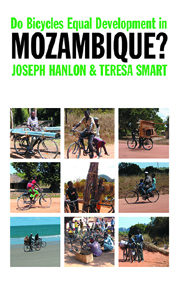Book contents
- Frontmatter
- Contents
- Acknowledgements
- The authors
- Money & measurements
- Abbreviations, acronyms & glossary
- Part I IS THERE DEVELOPMENT IN MOZAMBIQUE?
- Part II ACTORS & CONTEXT
- 9 Frelimo & the democratic one-party state
- 10 Corruption, rent-seeking, reform & a divided elite
- 11 Aid dependence & subservience: carrots & sticks
- 12 On the edge of the world
- Part III ALTERNATIVES & THE DEVELOPMENTAL STATE
- Appendix 1 Aid
- Appendix 2 Investment & other tables
- Bibliography
- Index
12 - On the edge of the world
from Part II - ACTORS & CONTEXT
Published online by Cambridge University Press: 05 April 2013
- Frontmatter
- Contents
- Acknowledgements
- The authors
- Money & measurements
- Abbreviations, acronyms & glossary
- Part I IS THERE DEVELOPMENT IN MOZAMBIQUE?
- Part II ACTORS & CONTEXT
- 9 Frelimo & the democratic one-party state
- 10 Corruption, rent-seeking, reform & a divided elite
- 11 Aid dependence & subservience: carrots & sticks
- 12 On the edge of the world
- Part III ALTERNATIVES & THE DEVELOPMENTAL STATE
- Appendix 1 Aid
- Appendix 2 Investment & other tables
- Bibliography
- Index
Summary
As a small country in a large continent and larger world, the actions of others impose heavy constraints on the choices Mozambique can make, but also point to some of the opportunities. Mozambique has a number of advantages – land, people, and being a donor darling – but to the larger world it is marginal and peripheral, buffeted by decisions taken by people who may not even know it exists.
In this chapter we look in more detail at the global forces affecting Mozambique. We start with an embarrassing and damning independent evaluation of World Bank research – by evaluators chosen by the Bank's own chief economist – which shows Bank research to be incompetent and biased. Research underlying Bank policy prescriptions for Mozambique is poorly done and distorted for political ends. Why should that be?
Is it possible that the Bretton Woods institutions and many of the rich countries want Mozambique to stay poor and marginal and supported by Northern charity? Even if it is not their intention, senior BWI and donor officials are supporting structures of globalisation and policies for poor countries which are central to transferring resources from poor to rich; GDP per capita in the rich countries was 17 times that of poor countries in 1960, but by 1995 is was 77 times.1 At the very least, the BWIs are trying to maintain an intellectual hegemony for their view of the world, in the face of a growing body of alternative research which rejects their development models.
- Type
- Chapter
- Information
- Do Bicycles Equal Development in Mozambique? , pp. 137 - 144Publisher: Boydell & BrewerPrint publication year: 2008



